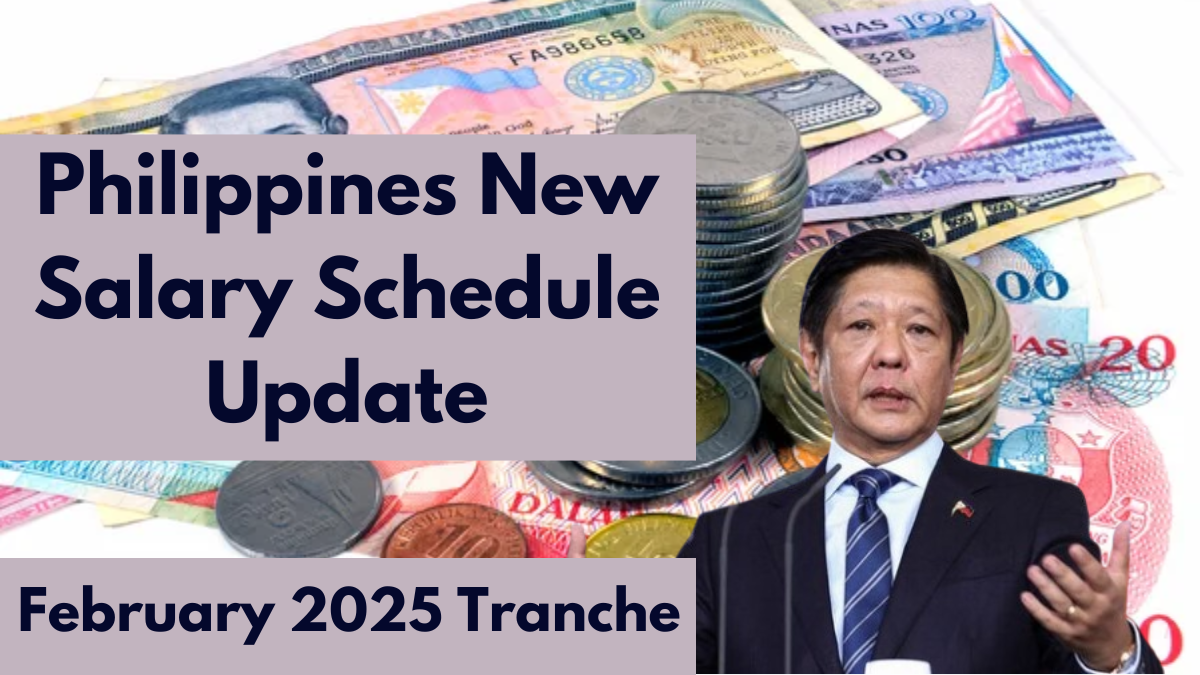The Philippine government has implemented the Philippines Salary Tranche, a systematic salary adjustment framework designed to ensure fair and incremental pay raises for government employees. This structured initiative operates under the Salary Standardization Law of 2019, which mandates gradual compensation increases over a four-year period. The objective is to enhance financial stability for public sector workers while maintaining economic balance.
By introducing this initiative, the government aims to improve employee motivation, attract skilled professionals, and promote equitable wage distribution. The new salary structure ensures that raises are determined by factors such as job position, experience, and performance.

Key Details of the Philippines Salary Tranche 2025-2027
The table below highlights the essential aspects of the salary adjustment framework:
| Feature | Details |
|---|---|
| Initiative | Philippines Salary Tranche |
| Governing Law | Salary Standardization Law of 2019 |
| Implemented By | Government of the Philippines |
| Effective Date | January 1, 2025 |
| Duration | Four Years (2025-2027) |
| Expected Increase | 23.24% for government employees |
| Official Website | www.dbm.gov.ph |
Breakdown of the Salary Tranche Implementation
The salary adjustments under this initiative will be implemented in multiple stages to ensure gradual financial adaptation. The following timeline details the structured rollout of salary increases:
Implementation Phases
- Tranche 1: January 1, 2025
- Tranche 2: January 1, 2026
- Tranche 3: January 1, 2027
- Tranche 4: To be determined based on economic conditions
This phased approach prevents economic strain while ensuring employees receive well-deserved compensation adjustments in a structured manner.
Sector-Specific Impacts of the Salary Tranche
Government and Public Sector Employees
- Salary increments will be applied based on job grade and tenure.
- Employees with specialized skills and higher educational qualifications may experience more significant pay increases.
- The structured pay scale ensures fairness and transparency in compensation distribution.
Implications for the Private Sector
- Though not directly governed by the Salary Standardization Law, the private sector often experiences wage shifts in response to government pay increases.
- A median salary growth of 6.2% is projected for private sector employees, particularly in industries such as finance, healthcare, and IT.
- Competitive wages may lead to talent migration between public and private sectors, affecting labor market dynamics.
Regional Salary Variations
- Salaries and minimum wages vary across different provinces in the Philippines.
- Metro Manila will record the highest minimum daily wage of ₱505.23 in 2025.
- Regional wage boards consider factors such as inflation, cost of living, and local economic conditions when determining salary adjustments.
Legislative and Policy Developments
Senate Bill No. 2504
Senator Christopher Lawrence T. Go introduced a bill proposing a four-step salary hike plan aimed at benefiting civilian government employees. The objectives of this bill include:
- Periodic evaluation and adjustment of salaries based on inflation and economic growth.
- Minimizing corruption risks by ensuring fair and competitive wages.
- Encouraging skilled professionals to join and remain in public service through attractive compensation packages.
Department of Budget and Management (DBM) Pay Raise Study
The DBM is conducting a comprehensive study to analyze:
- The effectiveness of the current salary structure.
- Potential adjustments in benefits and overall compensation packages.
- Private sector salary trends to ensure government wages remain competitive.
This study will provide valuable insights into future salary policies and contribute to an improved compensation framework for government employees.
Conclusion
The Philippines Salary Tranche 2025-2027 is a strategic initiative designed to provide structured salary adjustments, ensuring fair compensation for government employees. By phasing in the increases, the government aims to enhance employee welfare while maintaining fiscal responsibility. Additionally, legislative efforts and economic studies continue to refine and optimize salary policies, ensuring that public sector wages remain competitive and sustainable in the long term.
Stay informed about salary updates and related legislative changes by regularly visiting official government websites and monitoring economic reports.
Frequently Asked Questions (FAQs)
Q1: Who is eligible for the salary increase under the Philippines Salary Tranche?
A: All government employees, including those in education, healthcare, law enforcement, and administrative roles, are eligible based on their salary grade and tenure.
Q2: Will private sector employees also experience salary increases?
A: While not mandated, private sector salaries may rise due to market competitiveness, particularly in industries such as finance, IT, and healthcare.
Q3: How will the government ensure salary adjustments do not strain the national budget?
A: The phased implementation allows for controlled budget allocation while maintaining economic stability.
Q4: Will the salary increase be uniform across all government sectors?
A: No, adjustments will vary based on job roles, qualifications, and salary grades.
Q5: Where can I find the official salary schedule and updates?
A: Visit the official Department of Budget and Management website: www.dbm.gov.ph for the latest updates.
For More Information Click Here
